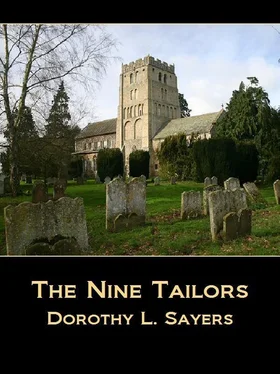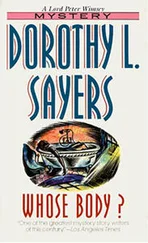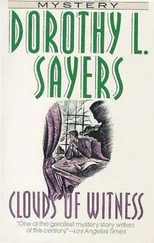Dorothy Sayers - The Nine Tailors
Здесь есть возможность читать онлайн «Dorothy Sayers - The Nine Tailors» весь текст электронной книги совершенно бесплатно (целиком полную версию без сокращений). В некоторых случаях можно слушать аудио, скачать через торрент в формате fb2 и присутствует краткое содержание. Жанр: Классический детектив, на английском языке. Описание произведения, (предисловие) а так же отзывы посетителей доступны на портале библиотеки ЛибКат.
- Название:The Nine Tailors
- Автор:
- Жанр:
- Год:неизвестен
- ISBN:нет данных
- Рейтинг книги:3 / 5. Голосов: 1
-
Избранное:Добавить в избранное
- Отзывы:
-
Ваша оценка:
- 60
- 1
- 2
- 3
- 4
- 5
The Nine Tailors: краткое содержание, описание и аннотация
Предлагаем к чтению аннотацию, описание, краткое содержание или предисловие (зависит от того, что написал сам автор книги «The Nine Tailors»). Если вы не нашли необходимую информацию о книге — напишите в комментариях, мы постараемся отыскать её.
The Nine Tailors — читать онлайн бесплатно полную книгу (весь текст) целиком
Ниже представлен текст книги, разбитый по страницам. Система сохранения места последней прочитанной страницы, позволяет с удобством читать онлайн бесплатно книгу «The Nine Tailors», без необходимости каждый раз заново искать на чём Вы остановились. Поставьте закладку, и сможете в любой момент перейти на страницу, на которой закончили чтение.
Интервал:
Закладка:
Dorothy L. Sayers
The Nine Tailors
Oxford-educated Dorothy Leigh Sayers (1893–1957) was one of the most popular authors of the Golden Age era. Born in England in 1893, Dorothy Sayers received her degree at university in medieval literature. Following her graduation, besides publishing two volumes of poetry, she began to write detective stories to earn money.
Her first novel, "Whose Body?" (1923), introduced Lord Peter Wimsey, the character for which she is best known. Wimsey, with his signature monocle and somewhat foppish air, appeared in eleven novels and several short stories. Working with his friend, Inspector Parker of Scotland Yard, Wimsey solved cases usually involving relatives or close friends.
Dorothy L. Sayers was well known for "combining detective writing with expert novelistic writing," and the imaginative ways in which her victims were disposed of. Among the many causes of death seen in her novels were, among others, poisoned teeth fillings, a cat with poisoned claws, and a dagger made of ice! (The Whodunit)
Dorothy Sayers also edited several mystery anthologies collected under the heading "The Omnibus of Crime" (1929), which included a noteworthy opening essay on the history of the mystery genre.
Later on in her life, Dorothy Sayers gave up detective fiction to pursue her other interests. She spent the last years of her life working on an English translation of Dante's Divine Comedy, having always claimed that religion and medieval studies were subjects more worthy of her time than writing detective stories

Dorothy L Sayers
Table of Contents
FOREWORD
I. A SHORT TOUCH OF KENT TREBLE BOB MAJOR
THE FIRST COURSE; THE BELLS ARE RUNG UP
THE SECOND COURSE: THE BELLS IN THEIR COURSES
II. A FULL PEAL OF GRANDSIRE TRIPLES
THE FIRST PART: MR. GOTOBED IS CALLED WRONG WITH A DOUBLE
THE SECOND PART: LORD PETER IS CALLED INTO THE HUNT
THE THIRD PART: LORD PETER IS TAKEN FROM LEAD AND MAKES THIRD PLACE
THE FOURTH PART: LORD PETER DODGES WITH MR. BLUNDELL AND PASSES HIM
THE FIFTH PART: TAILOR PAUL IS CALLED BEFORE WITH A SINGLE
THE SIXTH PART: MONSIEUR ROZIER HUNTS THE TREBLE DOWN
THE SEVENTH PART: PLAIN HUNTING
THE EIGHTH PART: LORD PETER FOLLOWS HIS COURSE BELL TO LEAD
THE NINTH PART: EMILY TURNS BUNTER FROM BEHIND
THE TENTH PART: LORD PETER IS CALLED WRONG
III. A SHORT TOUCH OF STEDMAN’S TRIPLES
THE FIRST PART: THE QUICK WORK
THE SECOND PART: NOBBY GOES IN SLOW AND COMES OUT QUICK
THE THIRD PART: WILL THODAY GOES IN QUICK AND COMES OUT SLOW
THE FOURTH PART: THE SLOW WORK
THE FIFTH PART: THE DODGING
IV. A FULL PEAL OF KENT TREBLE BOB MAJOR
THE FIRST PART: THE WATERS ARE CALLED OUT
THE SECOND PART: THE WATERS ARE CALLED HOME
THE THIRD PART: THE BELLS ARE RUNG DOWN
FOREWORD
From time to time complaints are made about the ringing of church bells. It seems strange that a generation which tolerates the uproar of the internal combustion engine and the wailing of the jazz band should be so sensitive to the one loud noise that is made to the glory of God. England, alone in the world, has perfected the art of change-ringing and the true ringing of bells by rope and wheel, and will not lightly surrender her unique heritage.
I have to ask the indulgence of all change-ringers for any errors I may have made in dealing with their ancient craft. The surnames used in these books are all such as I have myself encountered among the people of East Anglia, but every place and person described is wholly fictitious, as are also the sins and negligences of those entirely imaginary bodies, the Wale Conservancy Board, the Fen Drainage Board and the East Level Waterways Commission.
My grateful thanks are due to Mr. W. J. Redhead, who so kindly designed for me the noble Parish Church of Fenchurch St. Paul and set it about with cherubims.
DOROTHY L. SAYERS
I.
A SHORT TOUCH OF KENT TREBLE BOB MAJOR
(Two Courses)
704
By the Course Ends
64352
23456
8th the Observation.
Call her in the middle with a double, before, wrong and home.
Repeated once.
(TROYTE.)
THE FIRST COURSE
THE BELLS ARE RUNG UP
The coil of rope which it is necessary to hold in the hand, before, and whilst raising a bell, always puzzles a learner; it gets into his face, and perhaps round his neck (in which case he may be hanged!).
TROYTE On Change-Ringing.
“That’s torn it!” said Lord Peter Wimsey.
The car lay, helpless and ridiculous, her nose deep in the ditch, her back wheels cocked absurdly up on the bank, as though she were doing her best to bolt to earth and were scraping herself a burrow beneath the drifted snow. Peering through a flurry of driving flakes, Wimsey saw how the accident had come about. The narrow, humpbacked bridge, blind as an eyeless beggar, spanned the dark drain at right angles, dropping plump down upon the narrow road that crested the dyke. Corning a trifle too fast across the bridge, blinded by the bitter easterly snowstorm, he had overshot the road and plunged down the side of the dyke into the deep ditch beyond, where the black spikes of a thorn hedge stood bleak and unwelcoming in the glare of the headlights.
Right and left, before and behind, the fen lay shrouded. It was past four o’clock and New Year’s Eve; the snow that had fallen all day gave back a glimmering greyness to a sky like lead.
“I’m sorry,” said Wimsey. “Whereabouts do you suppose we’ve got to, Bunter?”
The manservant consulted a map in the ray of an electric torch.
“I think, my lord, we must have run off the proper road at Leamholt. Unless I am much mistaken, we must be near Fenchurch St. Paul.”
As he spoke, the sound of a church clock, muffled by the snow, came borne upon the wind; it chimed the first quarter.
“Thank God!” said Wimsey. “Where there is a church, there is civilisation. We’ll have to walk it. Never mind the suitcases; we can send somebody for them. Br’rh! it’s cold. I bet that when Kingsley welcomed the wild northeaster he was sitting indoors by a good fire, eating muffins. I could do with a muffin myself. Next time I accept hospitality in the Fen-country, I’ll take care that it’s at midsummer, or else I’ll go by train. The church lies to windward of us, I fancy. It would.”
They wrapped their coats about them and turned their faces to the wind and snow. To left of them, the drain ran straight as a rule could make it, black and sullen, with a steep bank shelving down to its slow, unforgiving waters. To their right was the broken line of the sunk hedge, with, here and there, a group of poplars or willows. They tramped on in silence, the snow beating on their eyelids. At the end of a solitary mile the gaunt shape of a windmill loomed up upon the farther bank of the drain, but no bridge led to it, and no light showed.
Another half-mile, and they came to a signpost and a secondary road that turned off to the right. Bunter turned his torch upon the signpost and read upon the single arm:
“Fenchurch St. Paul.”
There was no other direction; ahead, road and dyke marched on side by side into an eternity of winter.
“Fenchurch St. Paul for us,” said Wimsey. He led the way into the side-road, and as he did so, they heard the clock again — nearer — chiming the third quarter.
A few hundred yards of solitude, and they came upon the first sign of life in this frozen desolation: on their left, the roofs of a farm, standing some way back from the road, and, on the right, a small, square building like a box of bricks, whose sign, creaking in the blast, proclaimed it to be the Wheatsheaf public-house. In front of it stood a small, shabby car, and from windows on the ground and first floors light shone behind red blinds.
Читать дальшеИнтервал:
Закладка:
Похожие книги на «The Nine Tailors»
Представляем Вашему вниманию похожие книги на «The Nine Tailors» списком для выбора. Мы отобрали схожую по названию и смыслу литературу в надежде предоставить читателям больше вариантов отыскать новые, интересные, ещё непрочитанные произведения.
Обсуждение, отзывы о книге «The Nine Tailors» и просто собственные мнения читателей. Оставьте ваши комментарии, напишите, что Вы думаете о произведении, его смысле или главных героях. Укажите что конкретно понравилось, а что нет, и почему Вы так считаете.












